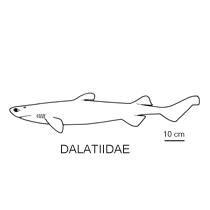- Classification
- CHONDRICHTHYES
- SQUALIFORMES
- DALATIIDAE
-
Fish Classification
-
Class
CHONDRICHTHYES Sharks, rays ... -
Order
SQUALIFORMES Dogfish Sharks -
Family
DALATIIDAE Kitefin Sharks
Family DALATIIDAE
Common name: Black Sharks, Kitefin Sharks, Seal Sharks
Summary:
Cite this page as:
Bray, D.J. 2023, Kitefin Sharks, DALATIIDAE in Fishes of Australia, accessed 06 Jul 2025, https://fishesofaustralia.net.au/Home/family/255
More Info
|
Family Taxonomy |
|
|
Family Remarks |
|
|
Author |
Bray, D.J. 2023 |




































